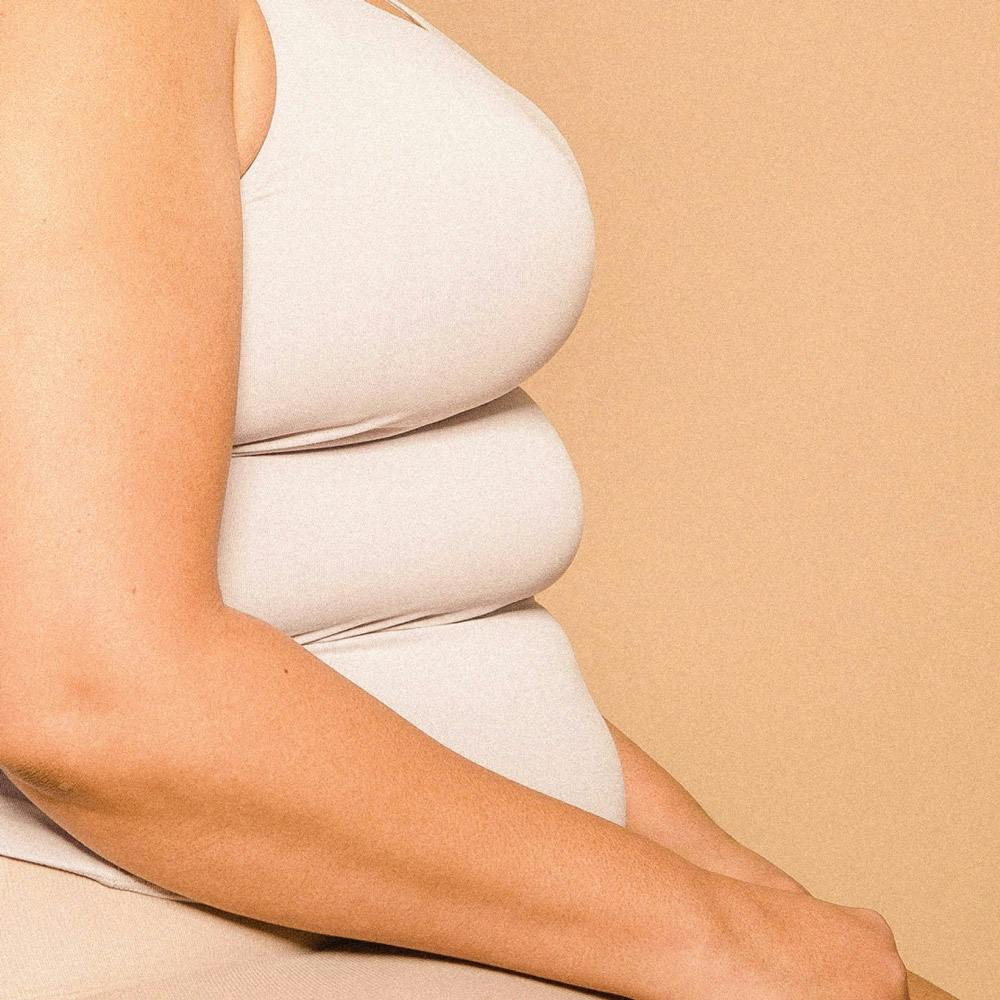Struggling with "meno belly"? This frustrating increase in abdominal fat during perimenopause and menopause happens due to hormonal shifts, fat redistribution, and weight gain. The good news? With tools like hormone replacement therapy and GLP-1s, small changes can make a big difference in managing meno belly and reclaiming your confidence.
Gather any group of midlife women together and the topic eventually will drift to the middle—to the “meno belly,” that is. For me, this happened a few weeks ago when I went out for drinks with a group of friends, right before we dove into a lively discussion about how to find the perfect jeans for this phase of life. Spoiler: The hunt continues!
“Meno belly” is that increase in abdominal fat that often seems to come out of nowhere during perimenopause and menopause. You’re living your life, doing the same things you always did—but it can feel like your body is playing by new rules.
In fact, 87% of Midi patients complain of weight gain and body changes. And that’s because there are really some new “rules” at work—specifically hormonal changes and metabolism shifts that are taking place. Declining estrogen levels are thought to be a major contributor to central abdominal fat. Once you learn a bit about what is happening, you can start to make the small changes that can help manage and improve menopause belly fat.
“Many clinical trials and animal studies have revealed that the decrease in estrogen seen in menopause triggers worsening insulin sensitivity. This drives up your floating blood sugar while starving your cells and results in weight gain as your body is triggered to store fat,” explains Midi’s Chief Clinical Officer, Mindy Goldman, MD, who’s been a practicing OB/GYN at the University of California, San Francisco (UCSF) for almost three decades.
“While these metabolic changes in menopause increase the risk for health issues such as weight gain, diabetes, and fatty liver disease, none of them are inevitable. We have never had access to so many tools to combat these changes.” From hormone replacement therapy to GLP-1s to strategic lifestyle tweaks, there’s a lot you can do to take back control of your weight and your shape.
Read on to learn more about meno belly—what causes it and how to reverse menopause-related weight gain, with advice from our Midi Health medical team.
Understanding Menopause Belly and Weight Gain
Meno belly refers to the accumulation of weight and belly fat during the perimenopause years and around menopause. Quick refresher: The National Institute on Aging defines menopause as a point in time 12 months after your last period; perimenopause can begin in your early 40s but varies from woman to woman, according to The Menopause Society.
“I call it the midlife muffin top,” says certified menopause practitioner Lauren Streicher, MD, a clinical professor of obstetrics and gynecology at Northwestern University’s Feinberg School of Medicine and the founding medical director of the Northwestern Medicine Center for Sexual Medicine and Menopause.
As estrogen begins its rocky decline, she explains, the way our bodies handle fat and insulin resistance changes:
“So even if you have a woman who is the exact same weight and she has not gained a pound, she may still get more of a protruding belly,” she adds. “So while weight gain certainly is potentially part of it, and there's a long list of the reasons why people do gain that weight during perimenopause and early menopause, but it's beyond that. There’s a redistribution of weight that gives you that menopause belly.”
The trouble with belly fat is that it’s not like other fat. Belly fat includes visceral fat, the kind that builds up deep inside the body and around your organs, in addition to the subcutaneous fat found just beneath the skin. Research has found that belly fat can lead to increased inflammation, which affects metabolism. An excess of belly fat can also lead to hypertension, insulin resistance, and cardiovascular disease. As metabolism slows down bit by bit with each decade, women gain about 1.5 pounds per year during their post-menopausal years. And during the period of perimenopause and menopause, due to the change in hormone levels, your basal metabolism may burn 250–300 fewer calories per day than before. Obviously that doesn’t sound like much—that’s basically one snack!—but it’s exactly that kind of incremental sluggishness that can lead to extra weight.
It's also worth noting that, as with most physical changes, this whole menopause stomach thing is fairly variable. That is to say: YMMV (your mileage may vary). What works for your friend may not be exactly the same for you, so don’t be discouraged if you need to untangle things in a bit of a different way than your peers.
And it’s not about the number on the scale either: “It's not about weight loss, it's about health gain,” says board-certified OB/GYN Mary Claire Haver, MD, author of the bestselling book, The Galveston Diet. “So many of us spend a lifetime fighting to get to a number on the scale, and we've sacrificed our health in order to do so. But a smaller body shouldn’t be your goal. Your health is defined by so much more than that.”
Common Causes of Menopause Belly
Meno belly has (quite loudly) entered the chat, so to speak. But why? What’s behind the bigger belly? Here are common reasons you might have a perimenopause or menopause belly even if your lifestyle hasn’t changed much:
Hormonal Changes
- Estrogen guides where fat is stored in your body—and helps distribute fat throughout the body—butt, breasts, hips, etc. Once estrogen takes a nosedive, fat starts to shift from hips and thighs to the belly. Exactly why this happens is not well understood, which makes it all the more frustrating. So while your weight on the scale may actually stay relatively stable, you may notice your waistbands are tight or you can’t zip up your skirts. Another hurdle: Since estrogen influences how your body responds to insulin, some women may develop insulin resistance at this time, which also affects your hunger and blood sugar levels.
- While estrogen is on a rapid downward spiral, changes in how testosterone is used by the body can further trigger fat redistribution. Testosterone also plays a role in how your body handles insulin, so it’s implicated in insulin resistance too.
- All of these hormonal shifts can also disrupt your appetite, thanks to decreased levels of hunger hormones leptin (which typically helps suppress appetite) and increased ghrelin (the one that makes you hungry). According to recent research from the Journal of the Endocrine Society some of the sleep disturbances that are hallmarks of perimenopause and menopause can also impact the levels of leptin and ghrelin—making you more tired and more hungry.
- Follicle stimulating hormone (FSH) can increase at this time, and a recent study of postmenopausal women found that higher levels of FSH (which goes up during menopause in response to lower estrogen) were associated with increases in body fat. Symptoms that emerge during perimenopause and menopause can make life downright miserable—sleep loss, hot flashes and night sweats, foggy thinking, among others. It’s natural and positive that many women seek relief and choose to go on hormone replacement therapy, or HRT, which includes progesterone. To understand progesterone’s role in HRT, also known as menopausal hormone therapy or MHT, you first have to understand the treatment more broadly. Let’s break it down:
Lifestyle Factors
While you can develop a menopause stomach without making any substantial changes to your diet or activity level, there are also a few lifestyle factors that can contribute to menopause belly around this time, including things like:
- Eating habits: The same foods you've always eaten, at the times you normally eat, may hit your body differently as your hormones shift.
- Exercise: Relying on the same cardio routine you've chugged through since your 20s may no longer deliver the same results.
- Disrupted sleep: When you're not sleeping well, you're less likely to make good eating choices or have the energy to exercise.
The deck is a bit stacked against you as you get older, in that you may experience anabolic resistance, which makes building muscle harder. Women lose 1-2 percent of their muscle mass per year starting at around 35, and that rate speeds up over time.
This is also why it’s so important to get support. Midlife isn’t the time to white-knuckle it or blame yourself for body changes. At Midi, we know how positive a woman's menopause experience can be when she works with a healthcare provider who takes her symptoms seriously. Midi clinicians are trained menopause specialists who can help you understand the “why” behind physical and emotional changes, and can offer a range of solutions, including prescription medications, supplements, and lifestyle coaching.
How Women Are Managing Menopausal Weight Gain
We often hear from Midi patients who have found success finally getting back to their happy weight after years of feeling stuck with stubborn gains, including meno belly. Every woman’s journey is unique, which is exactly why weight loss can’t be approached with a cookie-cutter mindset.
Science-Backed Strategies to Lose Weight and Reduce Meno Belly Fat
While the odds may not be in your favor during perimenopause and menopause, that doesn’t mean you’re doomed to be at a size or shape you’re not comfortable with. The goal is to help you get to your happy weight—and there are a lot of strategies that help reduce menopause-related belly fat in the process.
“Effective solutions for weight management range from hormone replacement treatments, non-hormonal prescription options, integrative therapies, and evidence based, effective diet, nutrition and lifestyle interventions,” says Dr. Goldman. “For many, a combination of these approaches is your best bet to positively impact your weight.”
Make Diet Changes to Help With Meno Belly
We don’t have to tell you that diet impacts your weight and fat distribution. You know that. And you may be finding that you can’t exactly “get away with” some of the treats you used to be able to indulge in. So it won’t shock you to hear that your best bet is to stick to a plant-based diet that is high in inflammation-fighting fruits, vegetables, and whole grains. Breads, meats and cheese? Delicious, but shouldn’t be the main attraction.
There’s been some research that finds low-carb diets (we didn’t say no-carb) can be helpful. In one study, postmenopausal women on a low carb diet lost 21.8 pounds, 27.5% of their body fat, and 3.5 inches from their waists within six months. Following the Mediterranean Diet—low in processed foods and rich in olive oil, fish, and vegetables in particular—can also help. In another study of men and women ages 55 years and older, those who followed a Mediterranean diet had significant reductions in abdominal fat.
Whether you go low-carb or Med or something else, prioritizing protein is always helpful, as it helps you stay fuller longer. Although the RDA for protein hasn’t changed for 30 years—it’s 0.36 grams per pound of total body weight, or 0.8 grams per kilogram—many experts are now saying women over 40, particularly regular exercisers, need more like 1-2 grams per kilogram to support tissue growth. To put that into actionable terms: If you’re a 150-lb woman, you need to aim for between 70-140 grams of protein. That’s a lot, yes, and nutritionists suggest working to incorporate 20-30 grams per meal, which may mean adding a scoop of protein powder to a morning smoothie or oatmeal, tossing some nuts or seeds on top of every salad, or ensuring that even your snacks (beef jerky! edamame!) help add protein to your day.

Engage in Physical Activity to Build Muscle and Reduce Cortisol
Since spot reducing a menopause stomach just isn’t possible (you can’t spot reduce any one area of your body), daily physical activity is what you should strive for. “Aerobic exercise and strength training are important throughout life and especially during menopause, thanks to their cardiovascular benefits,” says Midi’s Chief Medical Officer Kathleen Jordan, MD, a specialist in midlife weight management for women. “From brisk walking to running to cycling, any activity that gets your heart rate up counts. And regularly engaging in exercises with weights or resistance bands helps keep your muscles strong and limber. Building and maintaining muscle supports metabolism and contributes to your overall strength and energy.”
Several studies have shown that regular exercise significantly reduced menopausal symptoms and improved well-being. And whatever you choose to do, it all makes a difference: There’s research that shows that physical activity can have a greater impact on body composition in postmenopausal compared to premenopausal women. Other uncomfortable symptoms can also dwindle, thanks to exercise. According to a 2016 report in Menopause Review physically active menopausal-aged women experience fewer problems with insomnia, fewer vasomotor symptoms (hot flashes and night sweats), and better moods. The study also confirms that resistance exercise may reduce the decline in muscle strength in middle-aged women.
One piece of great news is that you don’t need to carve out a ton of time for it; there’s some research that indicates that exercise that’s more than about 40 minutes can actually increase levels of the stress hormone cortisol, which is known to play a role in increased belly fat. But if the workouts you like (and are likely to stick to) are longer than 40 minutes, there’s no need to hit stop after that duration. By all means, stay in your hour-long Pilates class, but don’t beat yourself up if you don’t have that much time. And finally, what’s the best exercise for menopause belly? The vast majority of research supports any exercise—all kinds, fast or slow.
Resolve Sleep Issues To Combat Weight Gain
“If a patient came to me and said, ‘I can't lose the weight,’ my first question would be, ‘How are you sleeping?’” says Dr. Streicher. “If they tell me they’re getting, at best, four hours a night, then I’m going to say, ‘Of course, you can't lose weight!’ You can’t lose weight if you don't get 6-7 hours of good sleep a night because not only is that going to completely mess up your hunger hormones, but you're not going to want to exercise. You're going to make poor food choices. Study after study has shown that if you're not sleeping, you're not going to lose weight.”
Dr. Haver agrees: “Sleep needs to be the cornerstone of your healthy routine, because that’s where all the magic happens,” she says. “Nighttime sleep is when we reset, when our muscles regenerate, when we clear out junk proteins, when we really combat aging. If you are not sleeping enough and feeling well rested, then you are on the struggle bus in all kinds of ways. So prioritizing your sleep and sleep hygiene is a must.”
Point taken, but getting a good night’s rest can be easier said than done. A few things you’ll want to prioritize:
- Limit screen time before bed. Late-night scrolling on devices can disrupt sleep hormones like melatonin and make it harder to fall and stay asleep.
- Aim to go to bed and wake up at the same time every day and get between 7-9 hours of sleep per night—even on weekends. This helps your body establish a consistent, healthy circadian rhythm that will help you fall asleep and wake up easily.
- Establish a calming bedtime routine. Maybe it's candles, soft music, or a relaxing bath. The goal is to set yourself up for success, so you’re not dropping into bed on edge from an intense TV show or ruminating about something that happened at work.
- Seek support. If your menopause symptoms are causing regular insomnia, ask your doctor or a Midi clinician for guidance on potential treatment options.
Consider Hormone Replacement Therapy to Combat Meno Belly
Research suggests that when hormone replacement therapy (HRT) is individualized to your needs, age, and family history, it’s the most effective treatment for the hot flashes and night sweats, as well as genitourinary symptoms (e.g. increased need to pee). Again, both of those issues can mess with your sleep, promoting weight gain.
It can also help with sleep. “If you’ve done all the right things to improve your sleep and you're still not sleeping, then we can consider medication,” says Dr. Haver. “If you're waking up at three in the morning and not able to go back to bed, estrogen therapy can go a long way for you.”
While HRT is not prescribed as a weight loss drug, there’s lots of strong evidence that HRT can act as a weight loss tool that helps with menopause belly and weight gain, in general, during the menopause transition. A 2018 study found that hormone therapy can help with visceral (belly) fat, BMI, and body fat. Women who receive HRT often show improvements in insulin resistance and blood lipid levels such as cholesterol.
HRT isn’t right for everyone—some women can’t take it, others prefer not to—but weight is just one more reason to consider it with a trained clinician guiding you. More targeted weight loss drugs may make sense for some patients, depending on their weight and health risk factors. (More on that below.)
Work With What You’ve Got: Fashion Tips for Meno Belly
If you’re self-conscious about your menopause muffin top—or just aren’t sure how to dress now that your contours are changing—there are strategies to feel comfortable and confident, including:
- Choose tops that don’t cling and are long enough to cover the entire belly even when you reach, bend or stretch.
- Embrace flowy silhouettes, and consider monochromatic dressing to create one sleek line. Pants and a blazer are a classic for a reason, says the AARP, as “the straight sharp lines of tailored pantsuits and blazer/pant duos have enough structure to gently reshape and firm the torso.”
- Get your clothes tailored. A simple step but one most of us never make time for. Yet, a properly tailored fit can be truly transformative for your shape.
- Contour with shapewear. If shapewear garments help you feel better, stock up on the ones that work for you (it might take some trial and error). If they make you feel like a sausage: skip!
- Get inspired. Sometimes social media can be really helpful, and when you need fashion advice, it’s one of those times. Seek out influencers with a similar shape and style to yours for outfit hacks. A few we’re loving:
Can Weight Loss Drugs Help Reduce Meno Belly?
Medications like Ozempic, Wegovy, and Mounjaro may be helpful if you’ve noticed hormone-related weight gain since you’ve entered perimenopause.
Known as GLP-1 meds, they have been shown to help people lose up to 20% of their overall body weight when paired with a healthy diet and regular exercise. Examples of GLP-1 meds that are FDA-approved for weight loss include Zepbound (tirzepatide) and Wegovy (semaglutide). Other medications, such as Ozempic (semaglutide) and Mounjaro (tirzepatide), are approved for diabetes but are often used off-label to help patients lose weight.
A small 2024 study showed promising results: When a small group of postmenopausal women were treated with semaglutide for one year, those who also received HRT showed approximately 30% more weight loss than those who didn’t receive HRT in conjunction with the drug.
However, these drugs aren’t for everyone. They’re typically appropriate for people with obesity (a BMI greater than 30) as well as those with a BMI greater than 27 and one or more weight-related conditions such as high blood pressure, type 2 diabetes, or high cholesterol. It’s also important to consider possible downsides, such as cost and potential side effects (like nausea, bloating, and indigestion).
“The idea is that you lose the weight, but then you have to maintain the weight, and that's only going to happen if you have a certain kind of a lifestyle,” says Dr. Streicher, who’s a proponent for GLP-1s in conjunction with the lifestyle changes we suggest above.
All medications carry risks, and these are no exception. If right for you, a Midi weight specialist can prescribe targeted GLP-1 medications. They can also prescribe other medications that may help with weight loss, including naltrexone/bupropion HCL (Contrave), metformin, Phenteramine, and Qsymia.

The Takeaway
- “Meno belly” is the result of an increase in abdominal fat that often seems to come out of nowhere during perimenopause and menopause due to both a redistribution of fat and weight gain.
- Declining estrogen levels are thought to be a major contributor to central abdominal fat. Once you learn a bit about what is happening, you can start to make the small changes that can help manage meno belly.
- What worked in your 20s to lose weight likely needs readjusting in your 40s and 50s, and that’s okay. Your approach to weight loss and meno belly should be individualized and may include a variety of strategies, says Dr. Goldman. “One person may benefit from a stress management strategy to help minimize ‘stress eating,’ while another may benefit from implementing sleep hygiene tactics as difficulty sleeping has long been linked to weight gain. Hormone therapy can be incredibly helpful in that it energizes women and supports them in leaning into their own health.”
- Weight gain during menopause is understandably frustrating, but there’s reason to be hopeful: We’ve never had access to as many tools to combat these changes, from hormone replacement therapy to GLP-1s, as we do today. It’s all about finding the best solutions to help you return to your happiest shape.
If you’re in perimenopause or menopause and want guidance from clinicians who specialize in women’s midlife health, book a virtual visit with Midi today.
Hormonal change is at the root of dozens of symptoms women experience in the years before and after their period stops.
Our trained menopause specialists can help you connect the dots to guide you towards safe, effective solutions.
Whether you need personalized guidance or a prescription routine to tackle symptoms—including brain fog, hot flashes, sleep trouble, mood swings, and weight gain—we’ve got you covered. Learn more here.
Midi’s mission is to revolutionize healthcare for women at midlife, wherever they live and whatever their health story. We believe that starts with education, to help all of us understand our always-changing bodies and health needs. Our core values guide everything we do, including standards that ensure the quality and trustworthiness of our content and editorial processes. We’re committed to providing information that is up-to-date, accurate, and relies on evidence-based research and peer-reviewed journals. For more details on our editorial process, see here.
 Liz Krieger
Liz Krieger
 Marissa Fontanez, DNP, FNP, FAIHM, MSCP
Marissa Fontanez, DNP, FNP, FAIHM, MSCP


